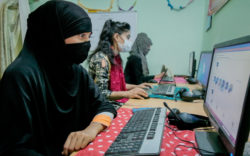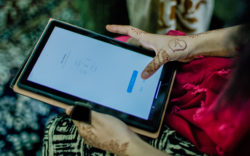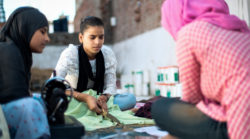November, 2020
In conversation with the project leads of Anubandh, an initiative by SEWA Bharat, about the origin, the challenges, and the achievements of the initiative
7 minutes read
One fine Saturday, amidst the pandemic of 2020, a few people gathered on Google Meet to talk about the story behind the stories. The story of SEWA Anubandh that brought forward the stories of women working in the informal sector from all over India.
The gendered impact of the COVID-19 has been lasting. However, the informal sector has received the hardest blow. Since a larger percentage of women, compared to men, work in the informal economy they’ve received the shorter end of the stick. Concentrated in low-paying, highly-precarious sectors, weavers, domestic helps, street vendors, sanitation workers and home-based workers who are women with the loss of job and migrant-exodus are reported to have faced higher health risks, increased domestic burden and decreased incomes. Social disadvantages and poor working conditions, rob them off any access to resources, with a struggle for two mere meals per day. In this struggle for survival, it is very important that their livelihoods are sustained to the degree of providing them with food. SEWA Anubandh is one such initiative.
- Could you give us a brief introduction about how this initiative was brought about?
Anubandh was a brainchild of the pandemic. To give a little context, having worked on Digital Beti, which is a joint initiative to overcome the digital gender gap in India, we realised that the female participation in home-based industries was high. Nonetheless, they faced their own set of challenges. The pandemic further exacerbated inequalities for women owned micro-enterprises. They faced greater loss and were in more debt.
Hence, the notion was to propel these women entrepreneurs. As SEWA already worked with women from the informal sector we knew about the inadequate laws safe-guarding these oft-ignored women. However we realised that the 3 basic things that also limit their growth were: entrepreneurial limitation, digital divide, and patriarchal semi-feudal structures that obstructed their social mobility. This strengthened our desire to help micro and nano based entrepreneurs who are SEWA members to start their growth towards long term socio-economic growth. We tried to hold design and entrepreneurial workshops that would improve their negotiating powers and communication skills, so that they too could involve themselves directly with national and international markets.
The SEWA Behene are micro enterprise leaders, and village mentors trained to bridge the information gap about the financial dealings. Many activities were envisioned to improve the skills of these women. Task force committees with external mentors from government, skilled designers, and entrepreneurs included to help the SEWA team to improve the entrepreneurial capacity of the sisters. To bridge the digital divide, Digital Libraries were established – physical spaces equipped with physical tools such as computers, laptops, tablets – so that they can access the internet, use excel, and access socials like Pinterest.
The women of the three states we’re working in made their livelihoods in different ways. In Uttarakhand where the traditional livelihood is farming, we’ve tried to introduce alternative farming practices and even started two more initiatives: SEWA Ekta that procures pulses and spices to sell further, with the sisters being the major stake-holders, and SEWA Atithi that grants skills for them to run their own home-stays. In Rajasthan, the women dabble in lac jewellery, aritari embroidery, and bandhej dying of the clothes. And West Bengal had women carrying forth their weaving and handloom legacies.
Seeing the scope of talent yet the prominence of obstacles, Anubandh was to connect the women sellers with customers, without the middle “men”.
- Could you talk a bit about Digital beti?
Digital Beti is a joint initiative to overcome the digital gender gap in India by training women from rural areas to become entrepreneurs, using digital tools. Started by SEWA Bharat in October 2019, and funded by Facebook, this project too aims at the empowerment and promotion of rural women entrepreneurs with specialised training, and access to electronics through Digital Libraries.

- Would Anubandh exist without the pandemic? Or was it a pre-COVID aspiration?
We cannot deny that the pandemic did act as a catalyst to fast forward our plans, and start the process as soon as possible. However, these objectives existed before the pandemic, but with COVID we realised the value of this activity. There was a need to restructure our plans as we had to shift from our “real” mode to a virtual mode of operating.
Launched around June 2020, we were trying to connect the Behene to larger international and national markets, and different businesses like Anokhi. Access to such large resources are limited to women as they cannot access the opportunity to enter the ecosystem due to language barriers, digital divides, access to documentation, competition and non-existent photography skills. When companies backed out due to their own limitations caused by the pandemic, the sisters needed money immediately. A severe breakdown in supply chains was witnessed. They barely had the time to manage “do time ki roti”
Hence, Anubandh made us realise the need for a platform as such where the sisters sell directly to the customers, where they realise the value of the product while learning entrepreneurial skills
- You mentioned competition. Should you not tie up with other platforms, rather take the independent route to make the best of both worlds? Why take this independent route?
The basic thing here would be visibility. Artisans do not get the chance for their names itself to be highlighted and other platforms erase the opportunity. This lack of self-visibility coupled with inadequate documentation discourages their financial and personal ambitions. We prefer to take a personal approach – we like to highlight where the product is coming from and the story behind it. The overarching theme is that the consumers must know where the product is coming from so as to create an emotional connect and trust between the buyers and the sellers. And to bridge the gap between the creators and their visibility. This would establish a brand for the Behen with their own space and emphasised visibility. Hence, Anubandh provides a larger opportunity despite taking a solitary route. Having said that, we do appreciate partnering with institutes who follow the same ideals as ours – for instance, Indian Craft House. They were interested in interacting with the Behene, and learning their stories, and hence, became an actual ally.
- That’s a commendable approach. I agree that the story adds to the impact value, beyond consumer attitude. From a monetary view – is it the best way to boost sales? Further, was the focus on how can we earn the most? Or did you consider the softer aspects associated with the fact that you’re working with rural entrepreneurs?
I’d like to take an indirect approach to answer this. SEWA follows the twin principles when dealing with women from the informal sector: Full employment and self reliance. We believe in balancing these two, as getting employment over a course of time leads to self-reliance. This is further strengthened when these women work among each other.
Hence the idea of micro-enterprise leaders creating batches so that behenes work with each other. If they move up the value chain, they themselves can fill the game. For example: In the weaving industry, the girls are just rolling threads or weaving, while the master weavers, who are men, give the design. If these women move up the skill chain, they teach others, and everyone moves together! They need to be given opportunities that make them self-reliant that shall generate direct income.
We are not making decisions. Anubandh is primarily moved by the behene. They make demands on their own terms, asking for what they specifically need. Our task is nudging and facilitating growth. They participate, as they realise their needs. For example: The women did not have access to loans in Uttarakhand. Hence, we started SEWA Sarthak to give loans. We work on what they demand. At their houses which have only one cell phone, either the male member uses it or the children do. They do not even have an opportunity to access it. A space to be created for their digital access was expressed as a demand. And we worked on it!
- What are the ground interventions, figures on impact, challenges faced, and the key learnings from Project Anubandh?
The key intervention was to mainly provide a platform for learning. Soft Skills Development like communication skills, negotiations skills etc. We tied up with Udhyam to improve their entrepreneurial capacities, in a way that they themselves could discover on their own. So that they themselves could answer what does it mean to be a ‘Udhyami’? The hard skills that they learnt were photography, using the internet to upload and download, digital rescues, and using other platforms like WhatsApp, to sell even more. The design skills passed unto them helped them better identify what skills are in demand, and how to make such patterns.

They learnt to navigate the entire entrepreneurial ecosystem, and also attend meetings online. This resulted in a steep learning curve for all of us. As we taught them how to get onboard on the meetings, they had to negotiate with their male counterparts for the cell phone and an hour off. They struggled a bit learning how to mute and unmute, organise their own meetings, but with a WhatsApp group created, they learnt from each other how to get through this together. Udhyam also worked with online support. Weekly meetings were held with a mentor to talk about their challenges and progresses. Connectivity issues persisted in the hills or during the cyclone Amphan but those who were left behind watched recorded videos to keep up. While we never asked them to buy a phone, and mainly directed them to the Digital Libraries to improve their skills, they nonetheless bought their own as they saw the device as an asset – a way to sell, connect, and learn. Most importantly, they learnt how to create a network of support which is not physically bound. These networks have started to become their groups as they work together and plan to sell products together while also, acting as a group applying for loans.
There is a lot of data regarding the impact. Interestingly, 2 more micro-enterprises (SEWA Ekta and SEWA Atithi) were incorporated into the skill distribution of Anubandh. More than 400 SEWA members received design related training. They even sold over 3 lakh products in the Jaipur Literature Festival. 60% members and families earned at least a minimum of Rs.1,500 per month supplementing their income, and 72% made their own catalogues for WhatsApp business. They created a social media presence to further improve their business, earning over Rs 25K per month from these ventures. Moreover, there were inspirational self-worth and empowerment indicators observed. At least 65% of the members said their confidence had increased; 80% mentioned that they had a positive outlook on life; and 65% indicated that they have become more financially literate, and considerate about long-term prospects rather than immediate ones.
The biggest challenge would be COVID itself! Organisations we had partnered with backed out and we were perplexed about ways to generate more or new business amidst the pandemic. Bengal had the additional challenge of Amphan. This resulted in delivery issues, time extensions, network issues. Most families were struggling for mere meals. Backward migration added to the financial burden on women. Instead of focusing on their business, we focused on their immediate needs – how to help with food, medicine, mask, information about COVID and schemes for the same provided by the government. In the handloom sector, abolishment of the handloom board, may also take away the social security schemes.
- How did you meet the market standards when dealing with customers?
Initially competition and target groups were to be identified. Further their wants were to be discovered in terms quality, interaction, design, service and packaging. Fulfilling the needs of the customers needed a lot of training where a lot of resources were spent. Leveraging platform interest, the behene needed to upskill themselves. To increase our repeat customers, we started adding the personal stories behind the products. This was our attempt to go above and beyond others.
The challenge is regarding how do we ensure that the customer trusts that their product comes directly from behene. Visibility is not enough. “Trust” is to be built too.

Price was another challenge, as customers were questioning the genuineness of the product. The sisters, due to the non-cooperation of the mahajans, were in dearth of money and hence were ready to sell their products for Rs. 500, while the fancy stores sell them for thousands and sometimes even lakhs. We usually hike up the price to a maximum of Rs. 1500, even then these doubts of authenticity flood in. While we want the customers to enjoy this transparency, it leads to doubt. For a saree that was sold for Rs. 5K, the customer had cancelled the order and it was difficult to return the amount as the money goes straight to the Behen’s bank account. These sisters give away their products on a cheap basis, which is not expected by the customer, hence, that leads to some trouble.
- What is the plan forward?
Anubandh is going to stay. Seeing the successes, we are reworking the strategy to make it more sustainable. We have even started working in Dehradoon with wooden products.
The questions faced in the forward journey are can we increase the number of industries on the platform? How do we get their journey started? Who and how do we take this forth?
We are trying to make this a full-fledged e-commerce platform where behenes themselves operate on the website with stronger connections and less intervention
About the project leads
Mr. Nikunj is working with the International Innovation Corps, the trust of the University of Chicago, as a project consultant and leading the projects under SEWA Bharat. He has more than 9 years of experience in the corporate & social sector in development domains. Some other feathers in his cap includes Teach for India Alum, Niti Aayog and Department of Education, Rajasthan.
Ms. Rekha started her journey in the development sector as a Teach for India Fellow in 2016. Since then, she has been assuming different roles in different domains. She has explored the school leadership role with Akansksha foundation. Then onwards she has worked as a branding, communication, and marketing consultant with SEWA Bharat and Indus Action.
References
- Remote interviews conducted by Women’s Identity and Progress

Leave A Comment